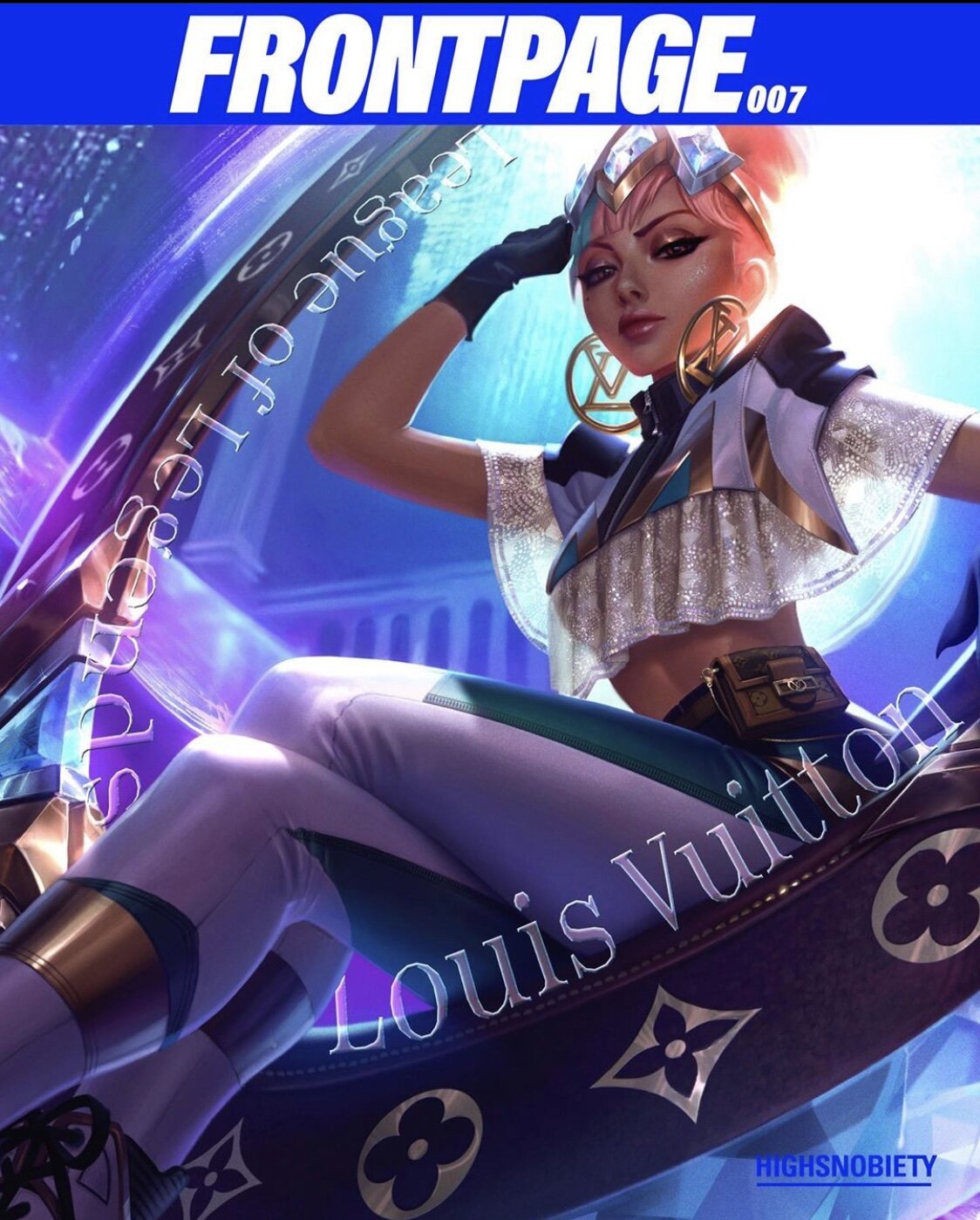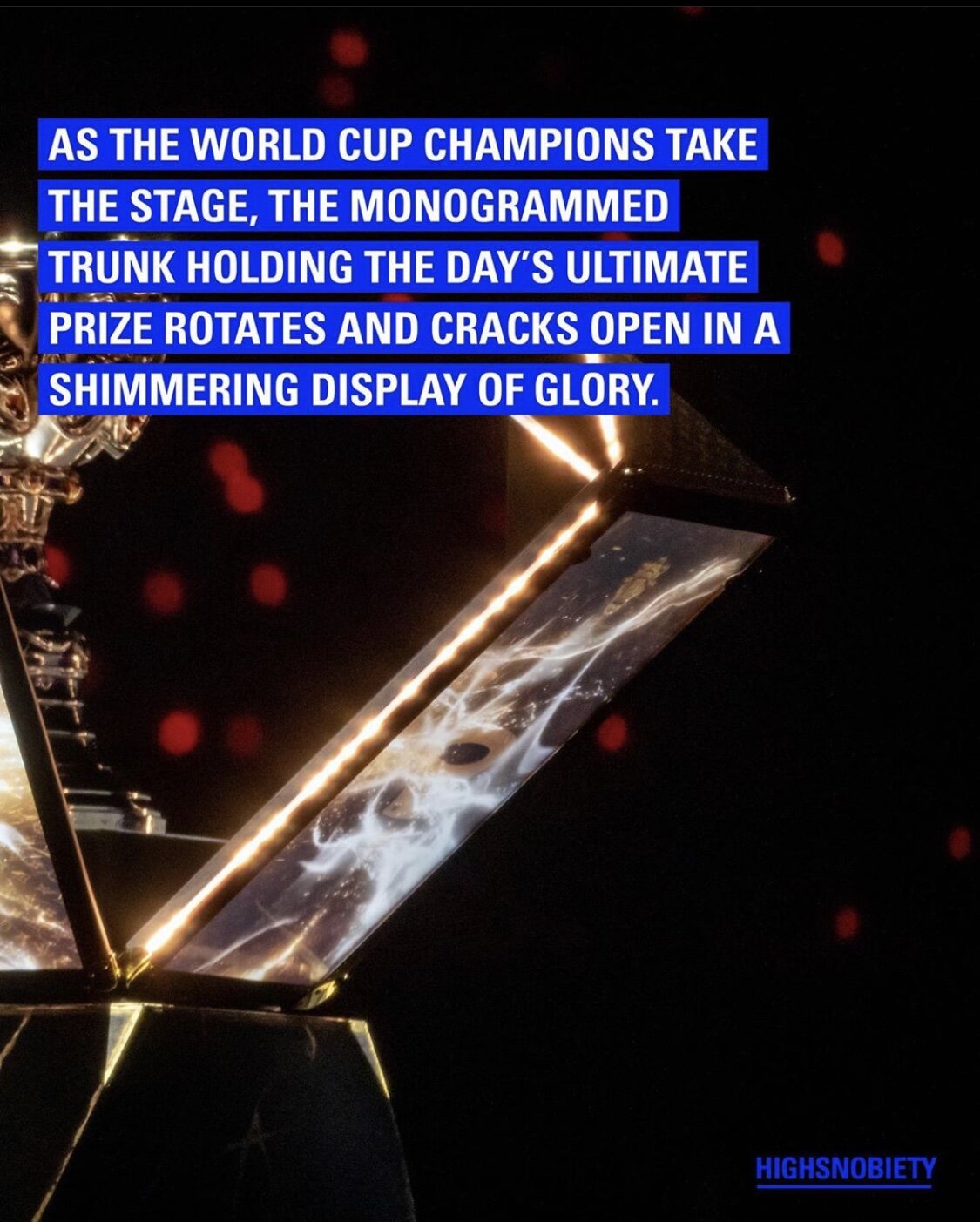





A DAY AT THE LV-MONOGRAMMED SUPER BOWL OF THE FUTURE
FRONTPAGE is Highsnobiety’s weekly online cover story exploring the people, moments, and ideas shaping culture today. For the seventh edition of our series, Mehdi Dakhli attends the 2019 League of Legends World Championships in Paris, France to get a first-hand look at the intersection of gaming culture and luxury fashion.
11 a.m. at the AccorHotels Arena, an indoor sports venue and concert hall in the 12th arrondissement of Paris, France. Even from the outside, the atmosphere is more akin to a UFC Conor McGregor fight night than an esports championship. From the excitable crowd waiting to enter the pyramidal-shaped venue to the scalpers looking to hawk tickets, there is an electricity in the air at the sold-out World Championship Finals of League of Legends, one of the most popular multiplayer video games in the world.
The game – a beefed-up digital version of laser tag – consists of two teams vying to destroy the other’s base and lets players choose one of the 146 different “champions” to help conquer a map. Excelling at the game requires a combination of muscle memory, clever keyboard-mouse coordination, and an encyclopedic knowledge of both the game’s workings and strategic shortcuts.
Outside the large gates, fans are already chanting the names of their favorite teams. Today, G2 Esports is facing off against Chinese pro-team FunPlus Phoenix for this year’s holy esports grail: $2.5 million in prize money and a 70-pound Summoner’s Cup trophy, presented in a decadent logoed trunk designed by Louis Vuitton, which stands tall between the competing pro teams onstage.
Once inside the arena – which is usually reserved for major sporting events and concerts of artists including Drake, Lenny Kravitz, and Britney Spears – almost 20,000 attendees surround four massive digital screens displaying the live gameplay. They’ve come out en force, loudly cheering for their favorite teams.
The Super Bowl-like pre-game entertainment that follows takes an unexpected turn. True Damage, a virtual band starring League of Legends champions (whose voices are brought to life by real-life pop stars Becky G, Keke Palmer, (G)I-dle K-pop member Soyeon, and American rappers Duckwrth and Thutmose) perform "live," much like Blur's Damon Albarn once brought The Gorillaz to life in the early 2000s.
Execs of Riot Games – the Los Angeles-based mother company of League of Legends – tell me that the singers performing "Giants," True Damage’s first single, weren’t a set-in-stone band, but instead an ever-evolving group whose virtual characters stay in place while the artists behind the avatars change.
During their performance, "enchantment" dust floats around the giant arena, with virtual League of Legends champions teleporting inside the venue. It’s a scene straight from a Harry Potter film. Add in extravagant Super Bowl entertainment with laser shows and holograms and you have an accurate representation of the 2019 League of Legends World Cup.
For a League of Legends first-timer such as myself, the game can seem overly complicated. According to the gameplay, players can buff up their character’s stats with experience gained from downed opponents, new weapons, and rare items. There are also variations on games, such as capture the flag, or large team skirmishes where the sole objective is to kill your digital opponents.
Unlike other games that have reached mainstream popularity (like Fortnite), the learning curve for League of Legends is decidedly more unforgiving. Ever since its 2009 launch, LoL has become the definitive game in the multiplayer online battle arena genre. The game’s lineage traces back to Defense of the Ancients, itself a 2003 mod of Warcraft III: The Frozen Throne. Where the O.G. Warcraft games focused on players strategizing around several units, DoTA simplified the process by having players control only one powerful hero at a time.
Sound complicated? If you don’t understand the basic mechanics by now, it's likely that you never will. Fortunately, being a spectator of "The Worlds" means that having a deep knowledge of the game isn’t a prerequisite to enjoying it, as I experienced first-hand.
During last year’s final, 99.6 million viewers tuned in via YouTube and Twitch (the Amazon-owned video-streaming service). The numbers, which have already surpassed the viewership of other high-profile sporting events (like the NBA All-Star Game), have led to brands taking notice of the massive market that currently consists of hundreds of millions of players. League of Legends alone has over 80 million monthly players, of which 27 million play daily.
In August, adidas signed its first pro gamer and YouTuber, Tyler Blevins aka Ninja – Twitch’s most-followed streamer – marking an important seal of approval from the fashion industry. Since then, Burberry and Louis Vuitton have launched branded virtual video games, allowing users to win real products. Earlier this year, Nike partnered with League of Legends Pro League (China’s national pro league) to become the official provider of footwear and apparel. Meanwhile, Intel is hosting an Olympics-sanctioned esports tournament featuring Street Fighter V and Rocket League for the 2020 Tokyo Olympics.
Therefore, this year’s Louis Vuitton partnership with League of Legends is not that surprising. Louis Vuitton has a heritage in making these custom cases, and already makes the travel case for FIFA’s World Cup trophy, amongst many others events.
“Louis Vuitton has been associated with the world’s most coveted trophies, and here we are today, alongside the Summoner’s Cup,” reads a statement by Michael Burke, chairman and CEO of Louis Vuitton. “We are thrilled to be part of such an iconic event.”
Louis Vuitton has been a pioneer in looking at video gaming as a market opportunity. For its Spring/Summer 2016 campaign, the brand’s womenswear creative director Nicolas Ghesquière tapped Lightning (the lead character of Square Enix’s Final Fantasy 13) as one of his muses, posing alongside Jaden Smith in a seasonal campaign.
For this year’s World Cup, Ghesquière’s fascination with science fiction went deeper than just designing the winner’s trophy case, to the praise of many fans. Qiyana and Senna, two League of Legends champions, were both dressed in custom digital skins for the opening ceremony’s live concert. The cosmetic “prestige” skin upgrades, which cost between $9 and $25 in real-world money, could be purchased online by fans and created a new audience for luxury brands along the way.
“The dematerialization of the product on one side creates great opportunities for distribution and scalability,” says Mario Ortelli, managing partner of Ortelli&Co., a luxury goods and high-end retail consultancy. “On the other hand, it increases the risks of brand integrity, defence, and one’s IP property.”
Vuitton has plans to deepen its commitment to the online sport beyond digital product alone. In December, a physical League of Legends capsule collection designed by Ghesquière is set to hit select stores, marking a potential long-term investment into the esports market.
Back in the arena, Naz Aletaha, head of global esports partnerships and business development at Riot Games, tells me about her take on brand partnerships: “We’re inspired by the entertainment [fans experience] in traditional sports.” Aletaha has helped bring companies like American Express and Louis Vuitton into esports, while also making competitions more professional by launching leagues around the world, alongside a franchise system similar to other professional sports leagues.
It’s a smart move, considering that the current 1,000 pro gamers now enjoy similar accolades and trappings of success as pro athletes do, earning their money through playing competitively, streaming sessions to their fans, and becoming product ambassadors. According to Forbes, the average North America League of Legends Championship Series (NA LCS) player's starting salary is now over $320,000 a year, with “over 70 percent of the players performing on multi-year contracts.”
At a time when “Ninja” is put in the company of NBA superstar James Harden, footballer Lionel Messi, and Kanye West – all of whom are on adidas’ roster – pro esports players can no longer be overlooked by the mainstream.
“Gamers were once perceived as outcasts and lazy people, but the societal perception around [them] has completely evolved, in a positive way,” Chinese movie star Zhu Yilong tells me in the arena.
In turning an esports competition into a full-on entertainment experience, Riot Games is expanding the appeal of its franchises. What becomes clear throughout the day is the bigger vision esports personalities have when it comes to the scope of their being. “Who knows if in five years from now G2 will have a deal with Disney to create a Pixar or Marvel movie; our job is to entertain, and gaming is simply the medium,” says Carlos “ocelote" Rodriguez, a retired gamer and owner of the European team G2 – fans tell me he is the José Mourinho of esports coaches. “I’m not a gamer anymore, because my ambition [kept] calling for more.”
John Needham, global head of League of Legends esports, agrees the sport has the potential to become bigger than it already is. “It’s important for Riot to create these cultural moments – like the Super Bowl half-time show – and entertain the fans,” he says, shortly before G2 is beaten by FunPlus Phoenix with 3-0. “We want to be an entertainment company, but our roots will always be deep [within] games,” Needham adds. “We [will create] fashion ourselves, as the entertainment company of the future.”
It's 4:30 p.m. by the time I leave the AccorHotels Arena – the game is over, but it feels like something else has just started.